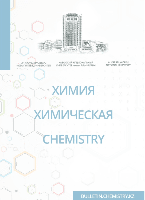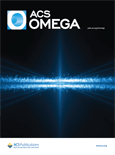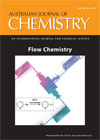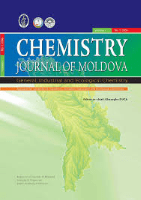
Bulletin of the University of Karaganda-Chemistry
Scope & Guideline
Catalyzing Ideas for a Sustainable Chemical Future
Introduction
Aims and Scopes
- Materials Chemistry:
The journal publishes research on the synthesis, characterization, and application of various materials, including composites, polymers, and nanomaterials. - Analytical Methods:
There is a strong emphasis on developing and validating novel analytical techniques, including chromatography, spectroscopy, and electrochemical methods for qualitative and quantitative analysis. - Environmental Chemistry:
Research addressing the impact of chemical processes on the environment, including waste treatment, pollution control, and the development of sustainable materials. - Biochemistry and Medicinal Chemistry:
The journal features studies on the synthesis and evaluation of bioactive compounds, drug delivery systems, and the exploration of natural products for potential therapeutic applications. - Inorganic Chemistry and Coordination Compounds:
Publications include the study of metal complexes, their synthesis, properties, and applications in catalysis and materials science. - Polymer Chemistry:
Research on the synthesis, modification, and application of polymers, including their physical and chemical properties, degradation, and biocompatibility.
Trending and Emerging
- Nanomaterials and Nanotechnology:
There is an increasing focus on the synthesis and application of nanomaterials across various fields, including catalysis, drug delivery, and environmental remediation. - Green Chemistry and Sustainable Practices:
Research that emphasizes environmentally friendly synthesis methods and the development of sustainable materials is on the rise, aligning with global sustainability goals. - Biomaterials and Bioengineering:
Emerging studies on the development and application of biomaterials for medical and environmental purposes indicate a growing interdisciplinary approach combining chemistry with biology and engineering. - Electrochemical Applications:
The trend of applying electrochemical methods for various analyses and material synthesis is gaining momentum, particularly in the context of energy storage and conversion. - Computational Chemistry and Molecular Modeling:
An increase in studies utilizing computational methods for predicting chemical behavior, optimizing reactions, and designing new compounds suggests a trend towards integrating theoretical approaches with experimental work.
Declining or Waning
- Traditional Organic Synthesis:
There has been a noticeable reduction in studies focused solely on classical organic synthesis methods, as the journal increasingly emphasizes more innovative and interdisciplinary approaches. - Basic Physical Chemistry Studies:
Papers that focus solely on fundamental physical chemistry concepts, without application to materials or environmental issues, are less frequently published, suggesting a shift towards applied research. - Conventional Inorganic Synthesis:
Research centered around basic inorganic synthesis techniques appears to be waning, as there is a growing preference for studies that incorporate advanced characterization techniques and applications.
Similar Journals

Moroccan Journal of Chemistry
Advancing Chemistry Knowledge, One Article at a Time.Moroccan Journal of Chemistry, published by the University Mohammed Premier Oujda, serves as a pivotal platform for researchers and professionals in the field of chemistry, particularly focusing on diverse and emerging areas within the discipline. Established in 2018, this open-access journal facilitates widespread dissemination of scholarly articles, ensuring that cutting-edge research reaches a global audience. With an ISSN of 2351-812X and categorized in the Q3 quartile for miscellaneous chemistry in 2023, the journal maintains rigorous peer-review standards while fostering an inclusive environment for scientific dialogue. Located in Morocco, it aims to bridge local and international research communities, contributing to the advancement of knowledge in chemistry. As it continues to grow, the Moroccan Journal of Chemistry remains an essential resource for students, educators, and professionals eager to stay abreast of the latest developments in the field.

Journal of Siberian Federal University-Chemistry
Advancing Chemistry Through Innovative Research.Journal of Siberian Federal University-Chemistry is a peer-reviewed academic journal dedicated to advancing the field of chemistry through the dissemination of original research, review articles, and innovative studies. Published by Siberian Federal University, this journal provides a platform for scholars in the Russian Federation and beyond to showcase their work in an ever-evolving scientific landscape. With an ISSN of 1998-2836 and an E-ISSN of 2313-6049, the journal is indexed in Scopus, currently ranked in the Q4 category for both Chemical Engineering and Chemistry, highlighting its emerging presence in these fields. The journal aims to foster collaboration and knowledge exchange among researchers, professionals, and students, thus contributing to the broader goals of scientific advancement. Although the journal operates under standard access conditions, its high-quality and diverse content ensures that it remains a valuable resource for those engaged in chemical research. In an era where interdisciplinary approaches are increasingly vital, the Journal of Siberian Federal University-Chemistry plays an important role by integrating various aspects of chemistry with related fields.

Chemical Bulletin of Kazakh National University
Fostering Global Dialogue in Chemical ResearchThe Chemical Bulletin of Kazakh National University is a prominent open-access journal dedicated to advancing the field of chemistry. Published by AL-FARABI KAZAKH NATIONAL UNIVERSITY, this journal serves as a vital platform for disseminating original research, reviews, and innovative findings in diverse areas of chemistry since its transition to open access in 2012. With an ISSN of 1563-0331 and an E-ISSN of 2312-7554, the journal aims to reach a global audience, fostering knowledge exchange among researchers, professionals, and students in the scientific community. The publication seeks to promote high-quality research that contributes to the understanding and application of chemical sciences, particularly in the context of Kazakhstan and the broader Central Asian region. Given the journal's commitment to making research freely accessible, it stands as an invaluable resource for anyone engaged in the study and application of chemistry.

ACS Omega
Bridging Gaps, Building a Community of Chemists.ACS Omega is a prominent open-access journal published by the American Chemical Society that has been serving the global research community since its inception in 2016. With ISSN 2470-1343, it focuses on a wide array of topics within the realm of Chemistry and Chemical Engineering, making it a crucial platform for researchers and practitioners aiming to disseminate significant findings across these disciplines. The journal maintains an impressive standing, ranking in the Q2 quartile for both Chemical Engineering and Chemistry categories, highlighting its impact and relevance in contemporary research. Additionally, with its Scopus ranks placing it within the top 24% and 27% of General Chemistry and General Chemical Engineering respectively, ACS Omega continues to foster innovation and facilitate collaboration among scientists. As an Open Access journal, it ensures that research outputs are freely available to all, enhancing the accessibility and visibility of contributors’ work, thus playing a critical role in advancing scientific knowledge globally from its headquarters in Washington, D.C.

Revista Virtual de Quimica
Connecting Researchers to Transformative Chemistry KnowledgeRevista Virtual de Quimica, published by the SOC BRASILEIRA QUIMICA, is a dynamic online journal based in Brazil, dedicated to promoting innovative research in the field of chemistry and related disciplines. Established in 2011, the journal has made significant strides in contributing to the academic landscape, receiving an impact factor that highlights its relevance, although it currently holds a Q4 quartile ranking in the miscellaneous category of Chemistry and Mathematics as of 2023. The journal is committed to open access, ensuring that scholarly articles are readily available to researchers, professionals, and students worldwide. Its focus encompasses diverse areas within general chemistry, aiming to foster knowledge sharing and collaboration among the scientific community. By providing a platform for high-quality research publications, Revista Virtual de Quimica stands as an essential resource for advancing chemical sciences and encouraging interdisciplinary studies.

AUSTRALIAN JOURNAL OF CHEMISTRY
Pioneering discoveries in diverse chemical disciplines.The Australian Journal of Chemistry, with an ISSN of 0004-9425 and an E-ISSN of 1445-0038, is a distinguished publication from CSIRO PUBLISHING, dedicated to advancing the field of chemistry since its inception in 1948. Based in Australia, this journal serves as a platform for original research articles, reviews, and innovative studies that encompass a wide spectrum of chemical disciplines, aiming to foster communication and collaboration among researchers globally. Despite its Q3 ranking in the Chemistry (Miscellaneous) category and standing at rank #236 in Scopus’ general chemistry classification, it remains an essential resource for professionals and students seeking to stay informed about emerging trends and discoveries in chemistry. The journal does not offer open access, emphasizing the premium quality of peer-reviewed content that adheres to rigorous academic standards. By bridging theory and practice, the Australian Journal of Chemistry continues to play a crucial role in shaping the future of chemical sciences.

Chemija
Cultivating a Deeper Understanding of Chemical Science.Chemija is a prominent journal in the field of chemistry, published by LIETUVOS MOKSLU AKAD LEIDYKLA in Lithuania. With a focus on diverse topics within the realm of chemistry, this journal aims to disseminate original research articles, reviews, and discussions that advance the understanding and application of chemical science. Although it currently holds a Q4 ranking in the miscellaneous category of chemistry, Chemija is committed to elevating its impact through the publication of high-quality research, making significant contributions to the discipline. The journal operates under a non-open access model, ensuring that articles undergo rigorous peer review to uphold academic standards. Researchers, professionals, and students are encouraged to explore the wealth of knowledge within its pages as it endeavors to bridge gaps across various subfields of chemistry from 2008 to 2024. With a dedicated readership and a growing database of insightful publications, Chemija serves as an essential resource in the ever-evolving landscape of chemical research.

Studia Universitatis Babes-Bolyai Chemia
Fostering Innovation in Chemical ResearchStudia Universitatis Babes-Bolyai Chemia, published by UNIV BABES-BOLYAI in Romania, serves as a pivotal platform for the dissemination of innovative research in the field of chemistry. With an ISSN of 1224-7154, this journal has been actively publishing since 2009 and aims to foster scientific collaboration and knowledge sharing among researchers, professionals, and students alike. Although currently categorized in Q4 of the Chemistry (miscellaneous) field, the journal provides an essential venue for emerging studies that contribute to the diverse landscape of chemical research. With its commitment to accessibility and scholarly discourse, Studia Universitatis Babes-Bolyai Chemia remains an important resource for those seeking to stay abreast of the latest developments and trends in general chemistry, holding a Scopus rank within the lower quartiles. Researchers and practitioners are encouraged to engage with its content to enrich their own work and to aid in the advancement of the scientific community.

Chemistry Journal of Moldova
Connecting Ideas: Where Chemistry Meets Practical SolutionsChemistry Journal of Moldova is a pioneering open-access journal dedicated to fostering the dissemination of significant research in the diverse fields of chemistry, including Environmental Chemistry, Process Chemistry and Technology, and more. Published by the esteemed Academia Sciences Moldova, Institute of Chemistry, this journal has been at the forefront of scientific inquiry since its establishment in 2006. With an ISSN of 1857-1727 and a digital presence through its E-ISSN of 2345-1688, it provides an accessible platform for researchers, students, and professionals to share and engage with cutting-edge findings. Although currently ranked in the Q4 quartile in several chemistry categories, the journal is committed to improving its impact within the academic community and aims to highlight emerging trends and technologies in the chemistry domain. The journal's office is located at 3 Academiei Str, Chisinau MD-2028, Moldova. As it converges its publication years from 2016 to 2024, the Chemistry Journal of Moldova invites all contributors and readers to explore its rich repository of research that bridges innovative ideas to practical applications.

CHEMICAL JOURNAL OF CHINESE UNIVERSITIES-CHINESE
Catalyzing Collaboration Among Chemists.CHEMICAL JOURNAL OF CHINESE UNIVERSITIES-CHINESE, published by Higher Education Press, serves as a vital platform for advancing research in the field of chemistry. With a history dating back to 1996, this journal has evolved to encompass a wide range of topics fundamental to the chemistry community, catering to both applied and theoretical perspectives. Although classified in Quartile 4 within the broader chemistry category, it remains a significant contributor to the knowledge base, ranking 281st out of 408 journals in the general chemistry category according to Scopus. Positioned in Beijing, China, the journal aims to foster collaboration among researchers and professionals while disseminating innovative research and developments. By promoting open exchange of ideas in chemistry, it strives to elevate the scholarly dialogue and contribute to ongoing education for students and professionals alike, with its content accessible through institutional subscriptions.